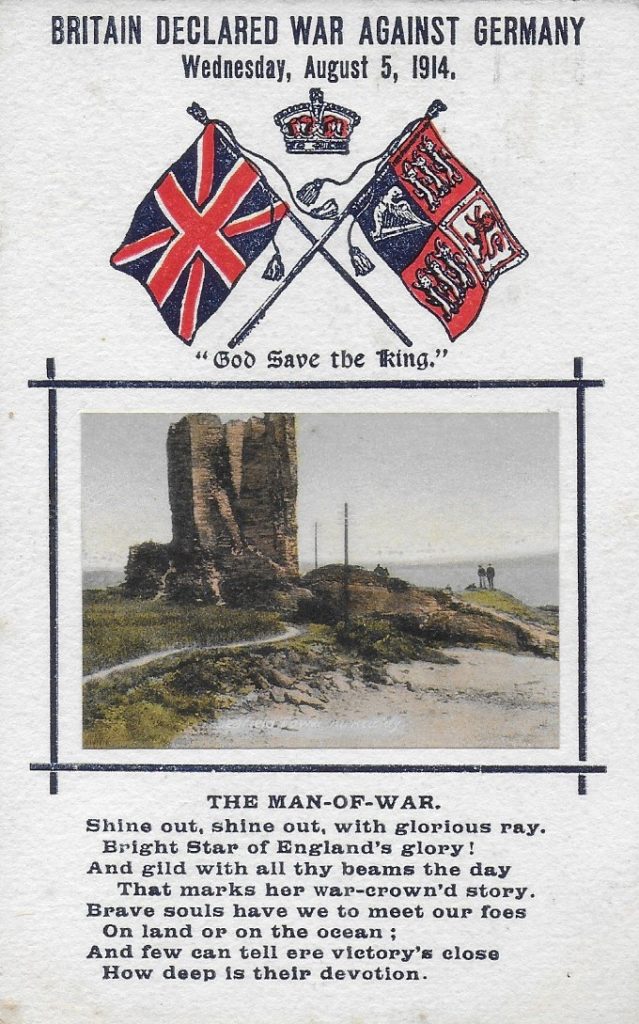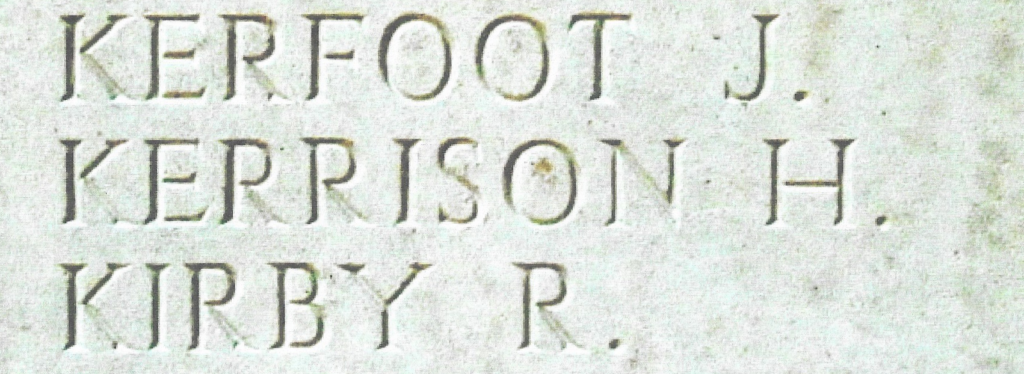26053 PRIVATE HORACE KERRISON
9TH BATTALION LOYAL NORTH LANCASHIRE REGIMENT
KILLED IN ACTION
3RD SEPTEMBER 1916
AGE 26 YEARS
Born in the village of Wissett on 10th June 1890, Horace Kerrison was the third child and son born to Eliza (née Pretty) and her husband Samuel, a farm labourer. The Wissett school register for the last decade of the 1800s shows that he had begun his education in March 1894, remaining there until October 1900, when his family had moved home to the Broadway, Halesworth, after which he then attended the town’s Boys School for his final years before finding work, possibly with his father, labouring on a farm. The Gales Almanack for Halesworth in 1913 listed the family as now living at 79 Chediston Street with Samuel having found work as a roadman employed by the local Urban District Council.
Horace’s military service has been very difficult to trace, other than through his medal roll entry which lists him as originally having been enlisted into the 3rd (Reserve) Battalion of the Bedfordshire Regiment which went on to spend the entire period of the war as part of the Harwich and Felixstowe Garrison. In the event of a German invasion they were tasked with defending both sides of the rivers Stour and Orwell estuaries. A secondary task was that of training men for regiments serving at the front.
In the fourth quarter of 1915, Eliza, his mother, passed away at the age of fifty-two years. It would have been shortly after this that Horace would have been conscripted to join the army to serve as 26393, a Private soldier in the 3rd Bedfordshires. By researching other members of his battalion with regimental numbers close to those of Horace, who had survived the war, his service becomes clearer. As most of their records remain complete, it is therefore possible to trace, with further research, what his service life consisted of up until his death in September 1916. After having spent some four or five months with the Bedfordshires, on 26th June 1916, he was a member of a draft of seventy-six men who were posted to join the 3rd (Reserve) Battalion Loyal North Lancashire Regiment. These were also serving as part of the Harwich Garrison. They only remained with the 3rd Loyals for a matter of a few days when they were issued with new equipment and regimental numbers, Horace becoming 26053, before crossing to France on 1st July to join the 9th (Service) Battalion of their new regiment.
The 9th (Service) Battalion Loyal North Lancashire Regiment had been formed as one of Lord Kitchener’s new army battalions in the Lancashire city of Preston in September 1914. After a year of training they landed in the French port of Boulogne on the 26th September 1915, then under the command of the British 25th Division.
At the time Horace and his chums had joined the 9th Loyals, they had recently become involved in the first week of the Somme battle. There they remained for some time. How Horace and the other replacements settled down is not known. They could not have joined at a more desperate time in terms of the loss of life suffered by the British Army over its long history. During the following two months, his battalion became involved in several small-scale actions in the Ovillers and Pozlieres areas of the Somme battlefield, with only minor losses and gains in territory, although suffering heavy casualties. On 2nd September 1916, the day of his death, Horace, with the 25th Division, were involved in mounting a large-scale attack in support of the 4th Australian Division. It was during this action that the 9th Loyals suffered a further thirty-seven deaths including Horace. Sadly his remains were never identified. He is remembered today, along with a further seventy-two thousand, three hundred and twenty-three others, on the Thiepval Memorial to the missing, located in the Somme region of France.
As yet another example of the losses suffered by many of Kitchener’s new army battalions, when the 9th Loyals had been formed in Preston just two years previously all of the men were from the local area. They then spent over a year to complete their training before crossing to the Continent in September 1915, some eight hundred and fifty men strong. Exactly a year later, on the 3rd September, of the thirty-seven men lost that day, only three were Lancashire-born, with the remainder originating in the main from the southern counties of England. Such would be the attrition suffered in both dead and wounded by the British Infantryman during the Great War.
In November 1918, Samuel, Horace’s father now in his sixties and possibly no longer able to continue being employed as a manual labourer, applied for and was awarded a weekly dependent’s pension in the sum of 5s.0d (25p) a week which he received up until his death in May 1921. This would have been followed in September 1919 by the final of two gratuity payments that totalled £6.12s.6d (£6.60p) for the loss of his son.
He would also have been entitled to claim Horace’s medal awards of the British War and Victory medal pair with his named bronze Memorial Plaque and Scroll.
The location of these is unknown.
HORACE’S NAME ON THE THIEPVAL MEMORIAL TO THE MISSING


